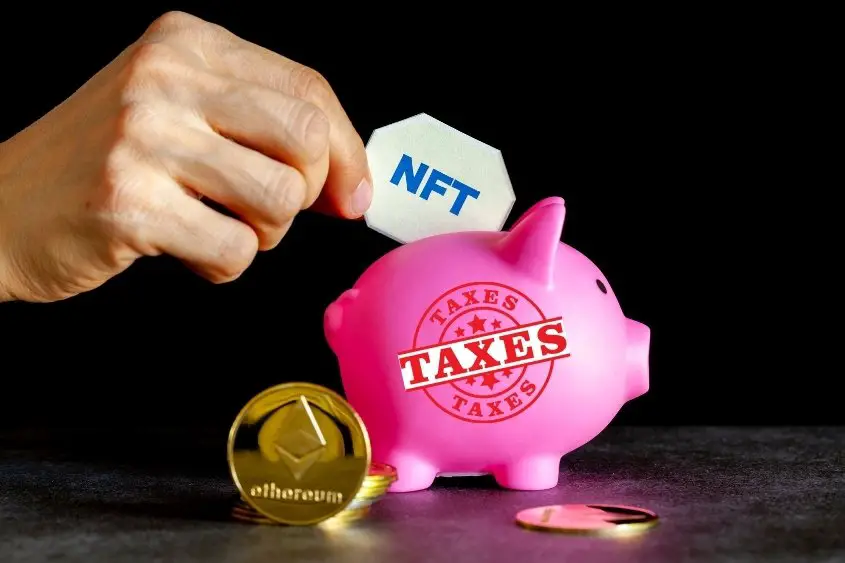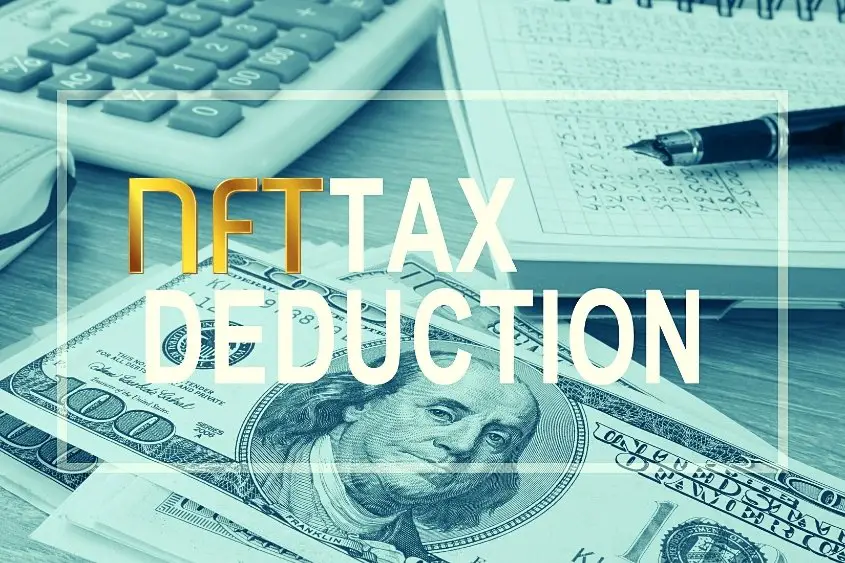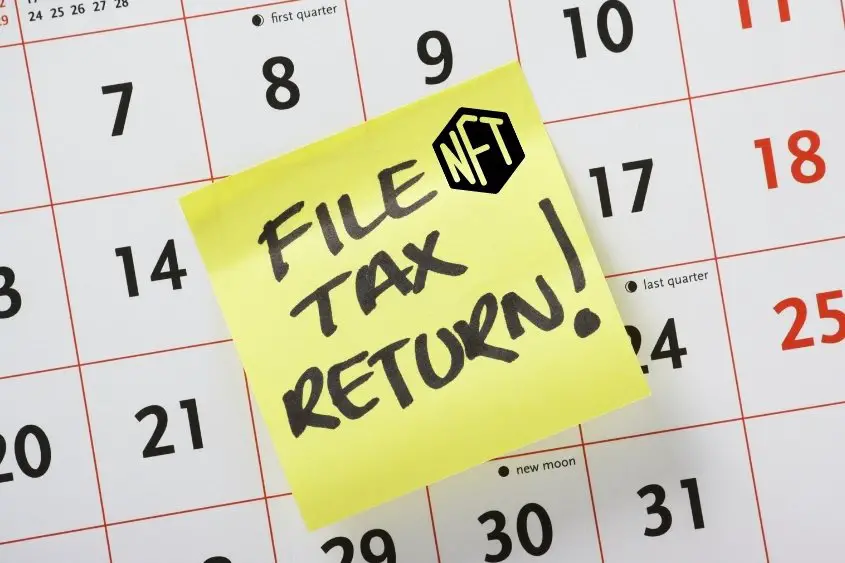Whether you are an NFT creator, investor, or legitimate business that has incorporated NFTs into your everyday life, you might be curious to know if you need to report your NFT transactions when filing your taxes, and if so, how should you do this?
To answer these questions accurately, I sat down with Alex Roytenberg from NFT.CPA to get the answers to all your NFT tax questions.
Every NFT transaction including buying, selling, and airdropping is considered a taxable event, whether it be a gain or loss. For NFT investors, selling NFTs is generally viewed as short or long-term capital gains, and creators who profit from selling their NFTs are taxed as ordinary income.
Alex has 20 years of tax, accounting, and finance experience, and has spent five years at Morgan Stanley, four years at Goldman Sachs, three years at PWC, and most recently spent three years at a global hedge fund where they managed roughly $42 billion. With that being said, let’s learn more about filing your NFT taxes.
Are NFTs taxed?

The critical thing to remember is that you need to report all your NFT transactions to the IRS. The IRS views any transaction as a taxable event. So, if you are buying and selling NFTs you must report your activity to the IRS.
Moreover, all tax returns are viewed by the IRS as the USD price at the time of the transaction, not the price of crypto. For example, if you bought an NFT for 1 ETH when ETH is valued at $1,500, and then you later sell that NFT for 1 ETH when ETH is valued at $3,000, you have a taxable gain of $1,500.
The same goes for if the value of ETH decreased, the IRS would consider that a loss.
Essentially, any exchange of an NFT is regarded as a transaction and is taxed based on the appreciation or depreciation of your NFT’s value in USD since its last transaction. So you pay taxes if you sell an NFT for more than you bought it, and you can deduct any losses if you sell it for less than what you bought it for.
It’s important to note that If you purchase an NFT with fiat currency (USD), that transaction is not taxed assuming you pay a sales tax at the time of the transaction. However, if you buy an NFT with crypto (or another NFT for that matter), it is considered a taxable event in the eyes of the IRS.
The IRS does not view cryptocurrency as money but as property, so any exchange involving crypto is a property exchange. The way IRS sees it when you buy something with cryptocurrency, you are selling the crypto asset and simultaneously acquiring another asset with the proceeds of that sale.
Therefore, when you buy an NFT with crypto you’re not really getting taxed on the purchase of the NFT, that would be a sales tax. You’re getting taxed on the sale of the cryptocurrency which is considered a capital gain.
How are NFTs taxed?
Now that we’ve established the situations that result in the taxation of an NFT, let’s examine what taxes are incurred. Let’s break it down into three separate categories.
1. Taxing NFTs as a creator (LLC or sole proprietor)
NFT artists and creators who sell their own NFTs are considered to be a business or sole proprietors, so your gains will be taxed as ordinary income on your Schedule C when filing your taxes.
Technically, the creation of an NFT is not taxable, only the sale of it. However, since converting a digital file into a unique and secure asset on the blockchain (the process known as ‘minting’) will take computational time and power, the creator will likely be assessed a gas fee by the blockchain.
The gas fee is always paid in cryptocurrency. As previously explained, any transaction on the blockchain is a taxable event. However, this obligatory fee can contribute to the cost basis of the NFT, thereby reducing the taxable amount when sold.
In other words, the gas fee may be considered a business expense and thus may be eligible for a tax deduction.
2. Taxing NFTs as an investor
As an NFT investor who buys and sells NFTs, your gains and losses go on your Schedule D as capital gains and losses. Most people buying NFTs are doing so as an investment, this is exactly why the IRS treats them the same way it treats other investment property assets with a capital gains tax.
The capital gains tax works with a short-term and long-term divide. Short-term capital gains are taxed higher than long-term to encourage stable investing rather than quick, day trading type activity.
| Tax Bracket/Rate | Single | Married Filing Jointly | Head of Household |
|---|---|---|---|
| 10% | $0 – $9,950 | $0 – $19,900 | $0 – $14,200 |
| 12% | $9,951 – $40,525 | $19,901 – $81,050 | $14,201 – $54,200 |
| 22% | $40,526 – $86,375 | $81,051 – $172,750 | $54,201 – $86,350 |
| 24% | $86,376 – $164, 925 | $172,751 – $329,850 | $86,351 – $164,900 |
| 32% | $164,926 – $209,425 | $329,852 – $418,250 | $164,901 – $209,400 |
| 35% | $209,426 – $523,600 | $418,851 – $628,300 | $209,401 – $523,600 |
| 37% | $523,601 + | $628,301 + | $523,601 + |
The split is along a holding period of 12 months. Any NFT sold within 12 months of the date of purchase is considered a short-term capital gain and is taxed at the same rate as standard income tax, ranging from 10%-37% depending on your total income for the year.
| Tax Bracket/Rate | Single | Married Filing Jointly | Head of Household |
|---|---|---|---|
| 0% | $0 | $0 | $0 |
| 15% | $40,400 | $80,800 | $54,100 |
| 20% | $445,850 | $501,600 | $473,750 |
Whereas any NFT sold beyond the 12-month mark after the date of purchase is considered a long-term capital gain and levied a top marginal tax rate of only 20%.
3. Taxing NFTs as collectibles
An NFT could be subject to collectibles tax rather than capital gains. Collectibles are items like artwork, stamps, antiques, trading cards, gems, etc. There’s no definition for what constitutes a collectible, and the IRS reserves the right to review and deem any item as such, so NFTs could get that treatment.
The primary difference between these two is the top marginal tax rate:
- For collectibles, it’s 28%
- For regular capital gains, it’s significantly lower at only 20%
This difference is only applied to long-term items, though. All NFTs sold within a year of purchase will be levied short-term capital gains whether or not the IRS would consider them collectibles.
Additionally, high-earners could be levied a 3.8% net investment income tax on top of capital gains or collectibles. This applies to people who make over $200,000 a year (or slightly different amounts depending on filing status).
4. NFT airdrops and giveaways
If you have airdropped an NFT, that event is viewed differently than a typical NFT purchase. In fact, Alex has very specific advice for those of you who are doing or considering doing NFT airdrops:
If you are someone who does NFT airdrops, you should talk to an attorney. You must make sure that since someone holds your NFT, it’s not considered a security. By doing airdrops, there’s a potential that your NFT will be considered a security.
Alex wants to stress that he is not an attorney, and for that reason he recommends you find an attorney to help you better understand if airdropping your NFTs will be considered a security.
If your NFT is deemed not a security by your attorney, then you may be eligible to deduct certain expenses for airdropping NFTs. Such expenses may be things like marketing, gas fees, and other expenses that come with airdropping NFTs.
What is considered a tax-deductible event with NFTs?

If you create and sell your own NFTs, the materials and supplies are considered tax-deductible. Likewise, if you attend a networking conference to help sell your NFTs, that is a deductible event. Also, the gas fees associated with NFT transactions (minting, selling, sending) are tax-deductible.
Since NFTs are generally treated as investable assets, any loss in value is treated the same. If you sell an NFT for less than what you bought it for, this depreciation is regarded as non-taxable income and therefore deductible.
An investor can also deduct the value of an NFT if they give it away as a charitable donation. The market value of the NFT at the time of the gift is the amount eligible for deduction.
This rule only applies to long-term items, though. If you try to use an NFT to make a charitable donation within a year of purchase, you can only deduct the amount you bought the NFT for, not any appreciation in the NFT’s value since that date.
What’s required to file your NFT taxes?
Every accountant will take a slightly different approach when filing your NFT tax returns, however, there are some key necessities regardless of how you file your tax returns, according to Alex.
Here are the two requirements to file your NFT taxes properly:
- All of your Web3 wallet addresses that you have used to transact (Metamask)
- Logins to all of your crypto exchange accounts (Coinbase, Gemini, etc.)
The reason you need to provide your wallet address and your crypto exchange login is so they can be entered into a data aggregation software that will retrieve all your transactional history.
The data aggregation software will take care of most of your transactional data, however, there may be some transactions that are in question, meaning you might have to provide more clarity as to what the transaction was.
NOTE: Never give out your wallet secret phrase, it is not required.
Can you file your own NFT taxes?
You can file your own NFT taxes using software like Zenledger which can be used with TurboTax. However, you might find it difficult to utilize a tool like Zenledger if you have 100 or more transactions or over $20,000 in profit due to potential errors that may need manual adjustments.
Alex says that if you have over 100 transactions, more than $20,000 in profit, or other complexities that may cause potential issues, then it may be best to reach out to a tax professional for assistance.
What if you don’t report your NFTs on your taxes?

If you don’t report your NFT transactions on your taxes, you are putting yourself at risk and exposing yourself in the chance that the IRS decides to audit you. This means increased fines and penalties that will cost you even more money, and potentially other legal ramifications.
If you report your NFT transactions on your taxes but it isn’t 100% correct, then the fines and penalties will be less compared to not reporting your transactions at all, which is considered fraud.
Remember, the IRS doesn’t generally audit you 6 months after filing your taxes, rather, you might receive an audit years after filing, which only increases the difficulty when trying to remember where you went wrong.
Common mistakes when filing NFT taxes
Filing your taxes can already be overwhelming, especially if you aren’t prepared. But when you add NFTs into the mix, things can get even more complicated. Here are some of the most common mistakes when filing NFT taxes:
1. Commingling funds
Commingling your Web3 wallet with funds from others is not a good idea since it will complicate reporting for both personal and corporate activities, and will eventually become a problem especially if done often.
Assume you and a number of your buddies decide to purchase a Bored Ape NFT. As a result, everyone transfers you ETH to your wallet to make the purchase. This gives the IRS a bad impression because they may believe you received that ETH as compensation and then simply decided to buy your own Bored Ape NFT.
This mixing of funds poses reporting concerns since it will be difficult to explain to the IRS. Instead, Alex suggests making a separate stand-alone wallet for such transactions to make them easier to trace.
2. Not providing all your wallet addresses
If you do not present all of your wallet addresses, not only will it be impossible to file your taxes correctly, but it will ultimately become known that you have other wallets by examining your blockchain transactions.
To avoid future difficulties, it’s critical to be open about all of your wallet addresses, crypto exchange accounts, and make sure to report them all.
3. Trying to keep track of all your transactions manually
It is critical to keep track of all of your NFT transactions. Some individuals like to maintain an Excel spreadsheet for every transaction detail, but Alex says it actually depends on your volume of transactions.
Alex proposes employing an automatic data aggregator to keep track of all your transactions, rather than an Excel spreadsheet. The reason for this is that if you manually input all of your transactions, you leave more chance for error than if you let the program monitor it for you.
Whatever your reason for getting involved in NFTs may be, understanding the tax implications can help keep you ahead of the game and out of hot water.
I highly recommend using one of the available programs to keep your NFT tax responsibilities straight and consulting a professional like Alex, for more detailed and personal advice.

2 thoughts on “The Ultimate NFT Tax Guide: Everything You Need to Know”
Comments are closed.